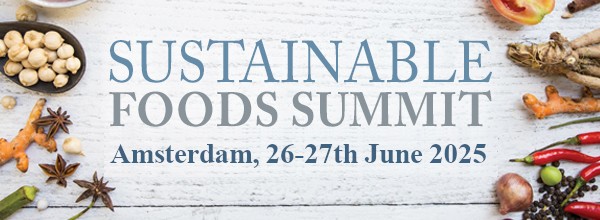The upcoming Sustainable Foods Summit, taking place on 26–27th June in Amsterdam, will cast the spotlight on sustainability schemes, green packaging, and sustainable food ingredients. The two-day summit will bring together leading industry experts, certifiers, policy makers, and innovators to explore how the food industry can push the sustainability agenda.
Sustainability schemes & eco-labels
The number of sustainability schemes and eco-labels has grown rapidly over the past two decades. Among them, organic remains the leading eco-label in the European food industry, with product sales surpassing EUR 50 billion. Luis Carazo Jimenez, Head of the Organics Unit at the European Commission, will provide an update on the European Organic Action Plan. Under its Farm to Fork strategy, the EU has set a target of organic farming to reach 25% of its agricultural land by 2030. Francesca Lilliu of IFOAM Organics Europe will share the latest data and trends on the European organic food market.
Dipti Vaidyanathan from the Roundtable on Sustainable Palm Oil (RSPO) will discuss the role of certification in the palm oil industry, where 12% of production now meets RSPO standards. Her talk will focus on certification’s role in enhancing transparency and traceability—especially in the context of the upcoming EU Deforestation Regulation.
The number of Life Cycle Assessment (LCA)-based eco-label schemes in the food industry is also increasing. These schemes give products ratings according to their environmental impact and can help consumers make sustainable choices. Koen Boone from Wageningen University will give a comparative analysis of the leading such eco-labels in the food industry. Tommy Buckingham from Carbon Trust will highlight the role of carbon footprint and labelling to meet consumer needs for low impact products.
A dedicated panel featuring experts from Kantar, Whole Foods Market, and FoodChain ID will explore consumer trust in labels, the risks of label fatigue, and strategies for more effective engagement.
Green packaging solutions
The summit’s green packaging session will open with insights from Dr. Wolfgang Trunk of the European Commission, who will detail the EU’s newly enacted Packaging and Packaging Waste Regulation, designed to cut waste and promote circular systems. The expanded Extended Producer Responsibility (EPR) rules will hold brands more accountable for packaging waste.
Dr. Alan Stuart Campbell (The LCA Centre) will explain how life cycle assessments can guide sustainable material selection. TerraCycle will showcase waste-diversion strategies, while Andrea Lunzer (Future Proof Studio) will discuss transitioning to unpackaged product models.
Innovative packaging case studies will be featured. Raffi Schieir, founder of Prevented Ocean Plastic, will reveal how ocean-bound plastics are being recovered and used by major brands like Danone and Moët Hennessy Louis Vuitton. Sebastien Bregeaud from Notpla will showcase seaweed-based “dissolvable” packaging, made from seaweed harvested in France, Spain, and South America.
A panel discussion will examine how to engage consumers in the shift toward sustainable packaging habits and alternative retail models.
Sustainable food ingredients
A dedicated session will explore new and emerging ingredients designed with sustainability in mind. Kaly Chatakondu of Arborea will introduce the company’s unique method of producing protein by capturing CO₂ and converting it into food using sunlight—an innovative approach that combines climate action with nutrition.
Kristian Damlund Gregersen of the Danish Technological Institute will discuss the ZEST project, which uses AI and fungal fermentation to turn agricultural waste into sustainable proteins. This initiative not only creates alternative protein sources but also upcycles by-products from agriculture, reducing waste.
Other speakers will cover ingredient traceability tools, biodiversity impacts, upcycled ingredients, and managing supply chain risks.


